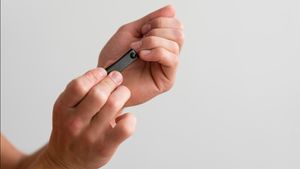YOGYAKARTA - Sometimes when fasting, a person experiences phlegm in the mouth or when he is coughing. Often the phlegm is swallowed even though it is fasting Ramadan. Many are wondering how the law swallows phlegm during fasting?
During Ramadan fasting, Muslims are required to hold back their lust from dawn to sunset. People who fast must avoid all activities that break their fast, including putting something in their mouth or saying it.
However, if something enters the mouth accidentally, it does not include breaking the fast. So can swallow phlegm can break the fast?
The question 'do you swallow phlegms of breaking the fast?' is often said during the month of Ramadan. The appearance of phlegms is often unavoidable and can happen anytime. Dahat is thick mucus originating from the lungs or hot channels, then it is emitted when coughing or vomiting.
Da'ak is often called balghom' in Arabic. In addition, there are also those who use the term nukhomah. While in the book Mausu'ah Al-Fiqhiyyah Al-Kuwaitiyyah, what is meant by nukhomah is something that comes out of the human throat.
Regarding the law of swallowing phlegm during fasting, there are different views from several scholars. There is an opinion that swallowing phlegm does not include activity that invalidates fasting. However, there are also those who say that swallowing phlegm can break the fast.
In the decision of the Egyptian Fatwa Institute (Dar al-Ifta) conveying three opinion of the cleric who stated that the lower swallowing of the phlegm did not cancel the fast.
Let's talk about it. Let's talk about it, let's talk about it, let's talk about it.
Meaning: "The ulama of the fiqh mazhab Hanafi, Maliki, and Hanbali history think that someone who fasts when swallowing a phlegm is not canceled. With differences in conditions and details."
Meanwhile, among the Syafi'i mazhab, the incident of swallowing phlegm during fasting was described in two opinions. This statement is stated in the book al-Hawi al-Kabir by Imam Abul Hasan Ali bin Muhammad al Mawardi.
The first opinion states that swallowing phlegm during fasting will cancel fasting. The second opinion states that it is not canceled, and the valid opinion is null and void.
"If phlegm comes out of the chest then swallows it, it's canceled, it's like vomiting. Meanwhile, if it comes out of the throat or brain then it's not canceled, because it's like saliva."
In addition to the two statements above, there is also an opinion stating that the cancellation or absence of fasting related to phlegm will depend on certain conditions. In the Secret Book of Fasting According to 4 Mazhab, Dr. Tariq Muhammad Suwaidan explained that issuing phlegm does not invalidate fasting according to the four schools.
SEE ALSO:
He further explained, but if the phlegm is swallowed up again after issuance, then the law is obliged to perform fasting without cadres. The law refers to the opinions of the Syafi'i and Hanbali schools. So if you swallow a phlegm that has been out, you have to replace the fasting day another day.
A different view from the Hanafi and Maliki schools that say that the law of swallowing phlegms during fasting does not include canceling things. However, phlegms should be thrown away or expelled because they are dirty objects that can bring disease into the body.
That's a review of the law about swallowing phlegm during fasting, whether canceling or not. From various views of schools and scholars, swallowing phlegm is not an cancellation. However, there are also those who state that fasting is canceled when the phlegm that has been released is no longer swallowed. Also read whether whiteness cancels fasting.
Stay up to date with the latest domestic and other overseas news on VOI. We present the latest and most updated nationally and internationally.
The English, Chinese, Japanese, Arabic, and French versions are automatically generated by the AI. So there may still be inaccuracies in translating, please always see Indonesian as our main language. (system supported by DigitalSiber.id)


















